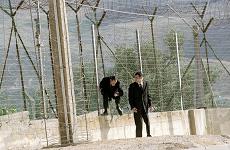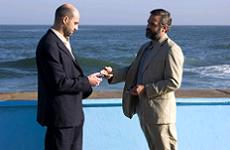| Academy Award Nominations for Paradise Now: |
| Best Foreign-Language Film |
|
| Golden Globe Nominations and Winners for Paradise Now: |
| ★ | Best Foreign-Language Film |
|
| Other Awards for Paradise Now: |
| Berlin Film Festival: Amnesty International Film Award |
| Independent Spirit Awards: Best Foreign-Language Film |
| National Board of Review: Best Foreign-Language Film |
| European Film Awards: Best Screenplay |
|
| Academy Award Nominations for Syriana: |
| ★ | Best Supporting Actor: George Clooney |
| Best Original Screenplay: Stephen Gaghan |
|
| Golden Globe Nominations and Winners for Syriana: |
| ★ | Best Supporting Actor: George Clooney |
| Best Original Score: Alexandre Desplat |
|
| Other Awards for Syriana: |
| Boston Society of Film Critics: Best Ensemble Cast |
| National Board of Review: Best Adapted Screenplay |


